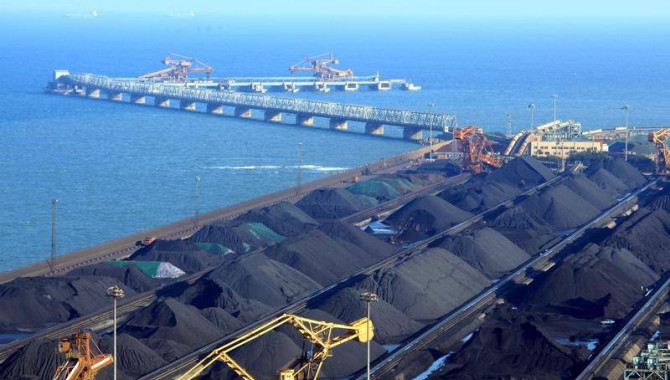
China has formalised import restrictions targeting Australia’s $14bn coal exports, Chinese state media has reported.
The National Development and Reform Commission met 10 major power companies on the weekend and granted approval for them to import coal without clearance restrictions, except for Australia, according to the Global Times.
The report suggested China will prioritise imports from Mongolia, Indonesia and Russia, and power companies will share inventory to ensure prices do not exceed 640 yuan ($97.8) per tonne.
China’s import restrictions have left hundreds of millions of tonnes of Australian coal anchored off the Chinese coast in a deepening trade dispute with Beijing.
In November, with at least 60 bulk carriers holding Australian coal stranded off the coast, Guardian Australia reported that China was likely to exclude Australian coal from plans to boost imports by 20m tonnes in 2020 until Australia handled the relationship with more “mutual respect and equality”.
Relations between the two countries have been strained by Australia’s position on China’s territorial pursuits, perceptions Australia has unfairly targeted China with its foreign interference regime and Scott Morrison’s call for “weapons inspector”-style powers to investigate the source of global disease outbreaks.
In April, China’s ambassador announced a consumer boycott against Australian goods, which was followed by tariffs on Australian goods including barley and disruptions in agricultural and resource exports.
Despite the increasing protectionism from China, Australia’s losses have been offset by rising iron ore prices, according to new analysis by Deloitte Access Economics.
Chris Richardson, a Deloitte partner and leading economist, said spot prices had risen by US$18 a tonne since 30 November amid fears that China may consider taking some action against Australian iron ore, resulting in markets “nervously bidding up prices”.
Richardson argued that the impact of rising domestic thermal coal prices in China could “mean that it may be unlikely to do much more than sabre-rattling on Australian coal”.
Nevertheless, the Global Times quoted local experts who suggested China’s supply of coal is stable, with an array of alternative sources of imports.
Wang Yongzhong, director of the Institute of Energy Economy at the Chinese Academy of Social Sciences, reportedly said that “as the relationship between China and Australia has been deteriorating” the latter was “gradually losing the Chinese market” to neighbours including Mongolia.
Australia has tried to reset the relationship with China numerous times, including in November after the signing of the Regional Comprehensive Economic Partnership and again in December after an inflammatory tweet by a Chinese foreign ministry official depicting Australian troops’ war crimes in Afghanistan.
Labor has accused the Morrison government of contributing to tensions by making foreign policy interventions like the call for an investigation into the source of Covid-19 to please a domestic audience.
On Monday, David Littleproud, Australia’s agriculture minister who has pushed for the Nationals to regain responsibility for trade, rebuked his New South Wales counterpart for criticism of Australia’s handling of the dispute.
Littleproud told ABC TV it was not constructive for “state ministers who do not have an … understanding of the complexities, nor have the national security briefings that federal cabinet ministers do, to make commentary on something they really do not understand”.
Littleproud shrugged off suggestions businesses impacted by trade tensions should be compensated, in the same way as Covid-affected businesses, arguing the dispute was a “market risk every exporter takes into account”.
Source:The Guardian
The opinions expressed herein are the author's and not necessarily those of The Xinde Marine News.
Please Contact Us at:
media@xindemarine.com


 Ningbo Containerized Freight Index Weekly Commentar
Ningbo Containerized Freight Index Weekly Commentar  Ningbo Containerized Freight Index Weekly Commentar
Ningbo Containerized Freight Index Weekly Commentar  Ningbo Containerized Freight Index Weekly Commentar
Ningbo Containerized Freight Index Weekly Commentar  BIMCO Shipping Number of the Week: Bulker newbuildi
BIMCO Shipping Number of the Week: Bulker newbuildi  Ningbo Containerized Freight Index Weekly Commentar
Ningbo Containerized Freight Index Weekly Commentar  Ningbo Containerized Freight Index Weekly Commentar
Ningbo Containerized Freight Index Weekly Commentar